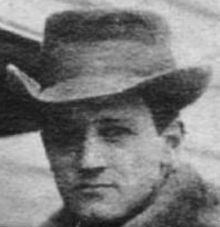Anton Dilger
| Anton Dilger | |
|---|---|

Dilger, before 1918.
|
|
| Born |
13 February 1884 Front Royal, Virginia, United States |
| Died | 17 October 1918 (aged 34) Madrid, Spain |
| Nationality | German American |
| Fields | Biology |
| Alma mater | University of Heidelberg |
Anton Casimir Dilger (13 February 1884 – 17 October 1918) was a German-American physician, and the main proponent of the German biological warfare sabotage program during World War I. His father, Hubert Dilger, was a United States Army captain who had received the Medal of Honor for his work as an artilleryman at the Battle of Chancellorsville (1863) during the American Civil War.
Dilger was born in Front Royal, Virginia, where his parents had relocated from Ohio in the decades after the Civil War. He was educated in Germany after going there at the age of nine. He attended Gymnasium in Bensheim and trained as a physician in Heidelberg and Munich, later working for the Heidelberg University surgical clinic while researching for his doctoral dissertation. His dissertation involved growing animal cells in tissue culture, at which he was unsuccessful. He received his doctorate summa cum laude in 1912.
Dilger was the grandson of anatomist Friedrich Tiedemann (1781–1861). Tiedemann was the Director of the Institute of Anatomy at Heidelberg University. He was also the cousin of Generalmajor Hubert Lamey (1896-1981), (Lamey was the Commander of the 118 Jager Division.) as well as General der Kavallerie, Carl-Erik Koehler (1895–1958). (Koehler was the Commander of the 20th Army Corp.)
There are reports that Dilger served as a surgeon in the Bulgarian Army during the Balkan War (1912–1913), that he served in the U.S. Army Medical Corps, that he carried the rank of colonel in the Imperial German Army Medical Corps, and that he directed hospitals for the German Red Cross. These reports are unsubstantiated.
...
Wikipedia
